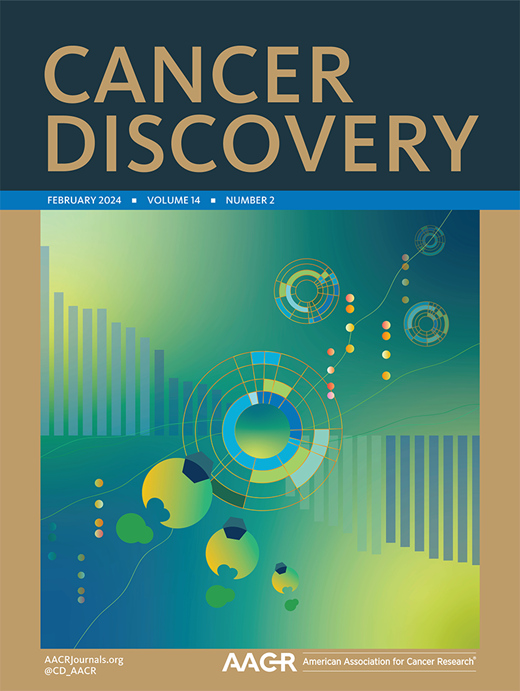Tumor-Associated NK Cells Regulate Distinct CD8+ T-cell Differentiation Program in Cancer and Contribute to Resistance against Immune Checkpoint Blockers
IF 33.3
1区 医学
Q1 ONCOLOGY
引用次数: 0
Abstract
Immune checkpoint blockers (ICB) targeting the PD-1/PD-L1 axis represent established therapies for many cancers. However, resistance occurs in most patients due to complex immune-suppressive mechanisms in the tumor microenvironment. NK cells can play effector roles in tumor control, but their impact on T-cell dysfunction and ICB efficacy remains controversial. Through genetic and antibody-mediated NK cell depletion, we found that a subset of tumor-associated NK cells plays a negative role in ICB sensitivity; they further impede CD8+ T-cell differentiation toward a CD69+ BCL2+ EOMES+ GZMB+ TIM3− GITR− phenotype. Mechanistically, the retinoic acid receptor α–dependent differentiation program in CD8+ T cells is hindered by tumor-infiltrating NK cells via competition for IFNα and IL-2. Finally, we observed that lower frequencies of NK cells correlate with better clinical responses to ICBs in patients with cancer. These findings suggest potential avenues for enhancing CD8+ T cell–centered immunotherapy by targeting regulatory NK cells. Significance: Although NK cells are traditionally viewed as antitumor effectors, our study uncovers their unexpected suppressive role in CD8+ T cell–based immunotherapy. By competing for cytokines, they disrupt retinoic acid receptor α–driven CD8+ T-cell differentiation and limit ICB efficacy. Clinically, reduced NK cell presence is associated with an enhanced immunotherapy response. See related article by Pozniak et al. p. XX肿瘤相关NK细胞调节肿瘤中不同的CD8+ t细胞分化程序并有助于抵抗免疫检查点阻断剂
靶向PD-1/PD-L1轴的免疫检查点阻断剂(ICB)代表了许多癌症的既定治疗方法。然而,由于肿瘤微环境中复杂的免疫抑制机制,耐药性在大多数患者中发生。NK细胞可以在肿瘤控制中发挥效应作用,但其对t细胞功能障碍和ICB疗效的影响仍存在争议。通过遗传和抗体介导的NK细胞耗竭,我们发现肿瘤相关NK细胞的一个子集在ICB敏感性中起负作用;它们进一步阻碍CD8+ t细胞向CD69+ BCL2+ EOMES+ GZMB+ TIM3 - GITR -表型分化。从机制上讲,肿瘤浸润性NK细胞通过竞争IFNα和IL-2阻碍了CD8+ T细胞中视黄酸受体α依赖的分化程序。最后,我们观察到较低的NK细胞频率与癌症患者对ICBs的更好临床反应相关。这些发现提示了通过靶向调节性NK细胞来增强CD8+ T细胞中心免疫治疗的潜在途径。意义:虽然NK细胞传统上被认为是抗肿瘤效应物,但我们的研究揭示了它们在基于CD8+ T细胞的免疫治疗中意想不到的抑制作用。通过竞争细胞因子,它们破坏视黄酸受体α驱动的CD8+ t细胞分化,限制ICB的疗效。在临床上,NK细胞的减少与免疫治疗反应的增强有关。参见Pozniak et al. p. XX的相关文章
本文章由计算机程序翻译,如有差异,请以英文原文为准。
求助全文
约1分钟内获得全文
求助全文
来源期刊

Cancer discovery
ONCOLOGY-
CiteScore
22.90
自引率
1.40%
发文量
838
审稿时长
6-12 weeks
期刊介绍:
Cancer Discovery publishes high-impact, peer-reviewed articles detailing significant advances in both research and clinical trials. Serving as a premier cancer information resource, the journal also features Review Articles, Perspectives, Commentaries, News stories, and Research Watch summaries to keep readers abreast of the latest findings in the field. Covering a wide range of topics, from laboratory research to clinical trials and epidemiologic studies, Cancer Discovery spans the entire spectrum of cancer research and medicine.
 求助内容:
求助内容: 应助结果提醒方式:
应助结果提醒方式:


